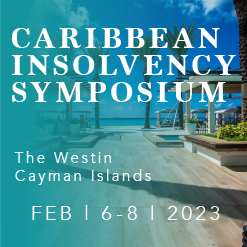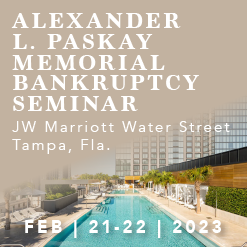| |
| |
| vol 22, num 1 | January 2023 |
| |
|
|
| |
|
|
|
|
|
| |
| Co-Chair Corner: Year in Review (2022) |
| 2022 has been a return to “normal” and a busy year for ABI’s Business Reorganization Committee. Committee members have taken advantage of the many benefits afforded to them, including the committee’s many newsletters and educational programs offered throughout the year, and have taken part in active discussions over the listserv regarding hot topics and industry trends. We have big plans for 2023, and we thank our committee members and leadership for their support and continued participation.
We are excited to continue growing and providing relevant and interesting content for our members. The committee always welcomes any ideas for newsletter contributions, webinar topics and other special projects. If you are interested in contributing, please reach out to the committee co-chairs, Robert Marticello or Jamie Fell. Their contact information can be found on the Business Reorganization Committee’s web page.
Below are a few highlights from the committee’s activities over the last year.
|
| |
|
|
|
|
| |
|
| |
| Ninth Circuit Holds that the Solvent-Debtor Exception Survived Passage of the Bankruptcy Code |
| If a solvent chapter 11 debtor designates creditors as unimpaired, what rate of post-petition interest must the debtor pay those creditors? That question has divided bankruptcy courts. Some have held that a plan must pay unimpaired creditors post-petition interest at the contract rate. Others have held that, “under equitable principles,” a plan must pay post-petition interest at a rate “the Court deems appropriate.” Yet another line of cases holds that unimpaired creditors are entitled only to the much lower federal judgment rate.
This fall, the Ninth Circuit answered that question, becoming the first circuit court to do so. In a divided opinion, the Ninth Circuit held that under the “solvent-debtor exception,” unimpaired creditors possess an equitable right to post-petition interest at either the contractual rate or the state statutory rate of default interest, subject to any other equitable considerations that might exist in the case.
|
| |
|
|
|
|
| |
|
| |
| Reliance Upon J. Alix Protocol May Preclude Exculpation in Fifth Circuit |
A New Exception to a Strict Fifth Circuit Prohibition
It is well settled in the Fifth Circuit that chapter 11 plans providing for nonconsensual releases of claims against parties other than a debtor violate § 524(e) of the Bankruptcy Code and are strictly prohibited. This prohibition has generally been interpreted broadly; for example, post-confirmation injunctions that effectively discharge nondebtor liability have also been found to violate § 524(e). Additionally, subject to certain limited exceptions, the Fifth Circuit has held that § 524(e) bars exculpatory provisions in a chapter 11 plan for nondebtors. That bar to nondebtor exculpation has, thus far in the Fifth Circuit, also precluded broad exculpation for estate professionals.
Recently, in NexPoint Advisors, L.P. v. Highland Cap. Mgmt., L.P. (In re Highland Cap. Mgmt., L.P.), the Fifth Circuit Court of Appeals once again reiterated § 524(e)’s prohibition of nondebtor exculpation while also examining certain recognized exceptions. Summarizing Fifth Circuit precedent, the Highland court explained that “exculpation [provisions] in a Chapter 11 reorganization plan [must] be limited to the debtor, the creditors’ committee and its members for conduct within the scope of their duties, […] and the trustees within the scope of their duties.” In what may constitute a potentially significant expansion of Fifth Circuit law, however, the Highland court found that exculpation of court-approved “Independent Directors” employed by the debtors’ estate did not violate § 524(e) given that such independent directors were
appointed “to act together as the bankruptcy trustee” for the debtor.
|
| |
|
|
|
|
| |
|
| |
| Crypto as Kryptonite: The Great Meltdown of 2022 |
“It’s like déjà vu all over again.”
— Yogi Berra
I’m a creature of habit, to be sure. It wouldn’t be the holidays without talking about a classic holiday movie: Frank Capra’s 1946 classic It’s a Wonderful Life. It’s the story of George Bailey, who inherits the Bailey Building & Loan Association founded by his father in the 1940s, and who forgoes his dreams of traveling the world to instead help the multicultural residents of fictional Bedford Falls, N.Y., realize the dream of home ownership.
What does any of this have to do with the recent, dizzying crash of many crypto exchanges and the resulting staggering loss of value of this phantom currency? If there’s any maxim that stands the test of time for me in 40 years of law practice, it is that history will repeat itself; the vignettes that flash across the economic landscape will just take different forms. |
| |
|
|
|
|
| |
|
|
|
|
|
|
|
|
|
| |








